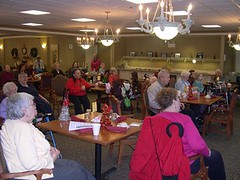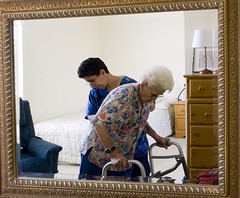By Bob Gregory
 |
| Cover of Judy Garland |
If aging were a game, then Independence would be its
name! There is really no such thing as
aging gracefully because most of us, regardless of how old, are fighting aging
with everything we have—including our savings.
I often hear from colleagues that the cry from the elderly population is
to remain at home for as long as possible.
The term “Aging in Place” has become a battle cry for many elderly as
they do not wish to give up their homes, which to most, equate to their
independence. The famous line by Judy
Garland “there’s no place like home” resonates among our elderly population
because after all, there is no place
like home! However, sometimes our
elderly need help to accomplish everyday tasks and we, their children, family members or guardians cannot always be there to provide the help. So what do we do to help our parents remain
at home and thus, independent?
First, I recommend you have your parent evaluated to make sure
there are no major underlying medical issues that need to be addressed. This is always a good first step when you
believe your elderly parent needs additional help—find out why so you can make
an informed decision. Assuming the
doctor sees no particular medical illness that would require medical services,
then have a discussion with your parent about the type help they feel they
need. I also recommend you observe your
parent doing daily tasks so you can make an assessment of your own.
For most elderly parents needing assistance, it is usually
for chores they are no longer able or comfortable attempting on their own. This is where Home Care (the non-medical Home
Care) can be of great help and extend your parent’s independence. Some common areas elderly need non-medical
help include:
Light Housekeeping
Eating Medication Management
Laundry Dressing Errands
Meal Preparation Bathing Shopping
Companionship Toileting Transportation
Bill Paying Continence Gardening
Once you and your parent determine the type help needed, you
can set a schedule for when services are rendered. Home Care companies are very flexible so you
can customize a schedule that will suit your parent’s needs and lifestyle. You will also want to consider the cost of
the services as you create the schedule.
Medicare’s home
health care benefit is limited and does not cover most non-medical home care
services that Medicare categorizes as Homemaker or Custodial Care Services. Most of the time, Home Care is paid
from the savings or financial resources of the individual receiving care. This
is commonly referred to as private pay or out-of pocket payment. However, check with your State as some
provide help for low-income seniors.
 Also, I encourage you not to overlook the “companionship”
portion of Home Care. Often, elderly
feel alone and isolated and that can cause everyday chores to seem impossible
to complete. I encourage you to
interview several Home Care services and make sure your parent is comfortable
with the individual that will be providing the services. Your parent may go to great links to stay
independent and in their own home, but you will find they are very particular
about who they allow to provide care!
Finally, don’t let a Home Care provider take your place when it comes to
providing care and companionship—they are there to complement you and not to
replace you!
Also, I encourage you not to overlook the “companionship”
portion of Home Care. Often, elderly
feel alone and isolated and that can cause everyday chores to seem impossible
to complete. I encourage you to
interview several Home Care services and make sure your parent is comfortable
with the individual that will be providing the services. Your parent may go to great links to stay
independent and in their own home, but you will find they are very particular
about who they allow to provide care!
Finally, don’t let a Home Care provider take your place when it comes to
providing care and companionship—they are there to complement you and not to
replace you!
If would like a list Home Care Agencies, Assisted Living
Facilities or any other type of Senior Facility, I hope you will consider www.seniorfacilityfinder.com.
If you would like to contribute your thoughts and ideas,
please leave them in our comment section. We want to hear them. Helping people
care for themselves or their loved ones is what we care about.
We look forward to reading yours.




































